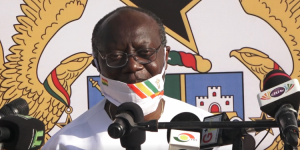A Deputy Minister of Finance, Dr John Ampontuah Kumah has urged the country to rally behind the government and support its efforts to improve the economy.
He said although the government was committed to quickly turning around the country’s current economic challenges, it required the collective efforts of all Ghanaians to do so.
With the country formally seeking economic support from the International Monetary Fund, Dr Kumah, said an IMF programme was expected to complement the fiscal and monetary measures initiated by the government through the 2022 budget and beyond.
“We expect the programme to assist in restoring confidence in the economy, narrowing the twin deficit, halting portfolio outflows, rallying Ghana’s bonds and restoring debt sustainability.
“Though IMF support is often short-term in nature, Government is highly confident that it will be able to support its efforts at turning around the economy, restore macroeconomic stability, sustain high growth, create jobs and protect social spending in sectors including transformative initiatives in education and health,” he stated.
Economy was on right track
The Deputy Minister noted that the country’s economy was on the right track and doing well until the COVID-19 pandemic, which caused significant fiscal and debt sustainability challenges for the country.
“Undeniably, prior to the COVID-19 onslaught, Ghana had come out of an IMF programme entered into in April 2015 and completed in 2019 with incredible results.
“Before 2015, Ghana was confronted with a myriad of challenges, including a twin deficit- current account and budget deficits, surging inflation, and a depreciating cedi. Interest rates rose to high levels as credit became hard to get and non-performing loans were on an upward trajectory.
“But the elephant in the room was the out-of-control government spending which was on an unsustainable path at the time,” he pointed out.
He noted that the country successfully completed the programme in April 2019 and was hailed by the IMF as one of the success stories in Sub-Sahara Africa
Significant gains
Dr Kumah, who is the Member of Parliament for the Ejisu constituency, said the government made significant gains by restoring debt sustainability with a robust debt management framework, enacted and achieved a fiscal deficit rule of five per cent or below, posted a yearly positive primary balance, and maintained zero central bank financing.
Within the context of these massive gains, he said the government had always been certain about its capabilities to wither the current economic challenges primarily caused by external headwinds such as the COVID-19 pandemic and recently the invasion of Ukraine by Russia.
“As a government, we have always taken decisions which protect the Ghanaian, and we will continue to do so even if it conflicts with our ideological position,” he stated.
Addressing economic challenges
He said the government was aware of the challenges faced by the economy and as such, tailored the 2022 budget to address the systemic revenue underperformance by introducing a number of tax measures.
The measures included the e-levy, restoration of the benchmark value, review of the tax exemptions bill, property tax, among others.
He said unfortunately, the delay in passing these tax measures by Parliament caused some tension among the investor community, resulting in many investors dumping the country’s bonds.
“This cascaded credit downgrades by rating agencies which further caused panic and Ghana notes moved to distressed levels.
“As a result, inflation started soaring, and the cedi also saw high depreciation,” he said.
Additional measures
In the face of these challenges, he said the country subsequently announced additional expenditure measures to complement the revenue and monetary policies which had been activated.
The expenditure measures included a 30 per cent cut in discretionary expenditures, a freeze on new hiring, a moratorium on new the creation of government units, a freeze on government travels, 30 per cent cut on salaries of the executive, among others.
Dr Kumah said these measures were to support the fiscal consolidation and debt sustainability concerns.
“Importantly, the measures were to quickly radiate and extinguish the impact of the external headwinds (commodity price shocks and supply chain disruptions) on the general economy.
“Through these rafts of measures, the government demonstrated its resolve to build back the economy quicker and restore fiscal rectitude.
“Our commitment to these measures assured us that we were on the right track and capable of causing a turnaround of the economy despite investor “credibility” concerns,” he stated.







